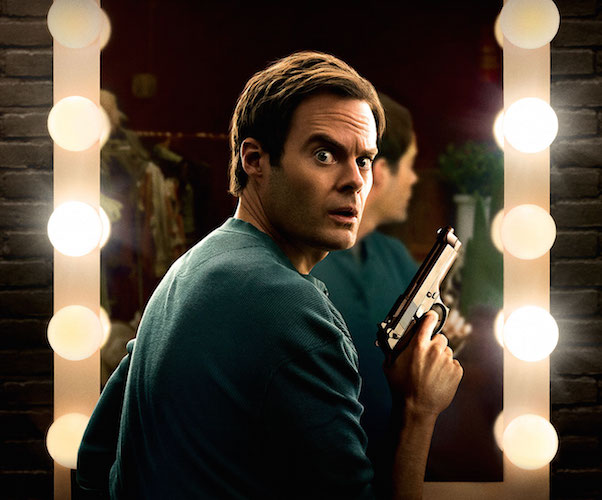Television Review: “Barry” — The Trials and Tribulations of a Low-Rent Hitman
One of Barry’s strongest attributes is its brand of dark, surreal, and unexpectedly witty satire.

Bill Hader in HBO’s new show “Barry.” Photo: HBO
By Matt Hanson
There’s been an influx of high-quality TV over the past few years but, as far as cultural relevance goes, the Emmys continue to bask in the long, thin shadow of Oscar. Presumably hired to make the show edgier, this years’ hosts Colin Jost and Michael Che sleepwalked through their opening monologue, which set the tone for the evening. Still, there was one interesting revelation: HBO’s new show Barry won Emmys for Best Actor and Best Supporting Actor and was nominated for three others, including Best Series.
Well known as an SNL cast member with a particular talent for impressions, Bill Hader co-created the show, wrote several of the episodes, and stars as the titular Barry Berkman. Barry is a mysterious low-rent hitman from the Midwest, a former Marine who ids disgruntled with his creepy life and follows a particular mark to sunny California, only to wind up joining an acting class. His origin story remains murky, but his manager and best (read: only) friend is one Monroe Fuches, played with shady charisma by the great Stephen Root. Barry’s admirable skill is he can do his sinister job unnervingly well — he’s completely efficient and without hesitation whenever he offs someone. Otherwise, he’s barely functional and takes no pleasure or pride in his work. The repressed, passive Barry has no way to express himself aside from rare bursts of anguish and loneliness; he is content to let the people around him take up most of the oxygen.
One of the show’s strengths is its stellar ensemble cast. Henry Winkler plays Gene Cousineau, Barry’s acting coach, with the perfect mix of flightiness and pompous self-regard. It’s clear how much he enjoys playing the character: this is the theatrical poohbah everybody remembers from high school acting class. Barry’s California assignment gets him into a treacherous stand-off between South American drug dealers and Chechen Mafiosi, who are brutal, ruthless, and hilariously suburbanized. Grisly torture scenes go down in well-kept garages, interrupted by a harried wife who is outraged that the sound of the drill is ruining their ten-year-old daughter’ birthday party.
One of Barry’s strongest attributes is its brand of dark, surreal, and unexpectedly witty satire. Barry’s lifestyle is not normal, and it’s not intended to be, but his fidgety introversion and grisly day job puts the so-called “real” world he skulks through into stark relief. When he receives a phone call from a prospective actress girlfriend giddily enthusing over an audition, Barry listens attentively from the balcony of his hotel room, oblivious to the Chechen gangsters ransacking his room and chasing Fuches around like a murderous version of the Keystone Kops. When Barry accidentally reveals the real circumstances of his life to Cousineau, he does it with such striking vulnerability that an impressed Cousineau mistakes it for an avant-garde monologue and lets him join his acting class. He even remarks that the plot of this assumed drama makes no sense, sending a welcome wink to the skeptical viewer.
The multiple Emmy nods are quite a stamp of approval this early in the show’s run, but Barry hasn’t hit its stride yet. The lead character is a strange creation, and his traits are hard to square at times. If he’s this good at killing people, then why can’t he assert himself in other parts of his life? Why does Fuches have such a Svengali- like hold on him? The concept of the hitman who is excellent at something he despises is intriguing — was it the stint in the military that warped his soul? — but we don’t know what motivates Barry beyond the fact that he is a loner with a strange job.
Important parts of his background, like his deep attachment to the oily Fuches, go largely unexplored. Why should we care about some mopey loser with a creepy job if we can’t see what makes him the way he is? We need a clearer sense of what inspired Barry’s strange mode of employment in the first place, and how acting classes might change him. Barry has some intriguing moments in which he is asked to perform monologues that overlap dramatically with the emotions that come from having to hide his dangerous secret life, but the show doesn’t get nearly as much out of this dramatic tension as it could.
What gives Barry its mordant, Coen brothers-like quality is that the more Barry tries to fit in with the so-called “normal” people, the stranger they become. As he flees an acting class to do some surreptitious wet work, his love interest psyches herself up by playing the absolute worst white girl power anthem music, lost in her ditzy ambition. The Chechen gangsters have amusingly gone native in the land of swimming pools and movie stars and send Barry hokey inspirational texts to help keep his murdering spirits up.
Barry is at its most dramatically arresting when it juxtaposes Barry’s bleak world view with the breezy Californication of the actors who have become the closest thing he has to friends.The last episode of the brisk first season ended with a cliffhanger that is almost too implausible, especially for a show that already strains at being reasonably believable. If the Emmy’s unexpectedly robust vote of confidence is going to pan out, the show needs to expand its emotional range, developing scenes that amusingly juxtapose Barry’s tormented inner life with the blithely superficial world he longs to join.
Matt Hanson is a critic for The Arts Fuse living outside Boston. His writing has appeared in The Millions, 3QuarksDaily, and Flak Magazine (RIP), where he was a staff writer. He blogs about movies and culture for LoveMoneyClothes. His poetry chapbook was published by Rhinologic Press.
